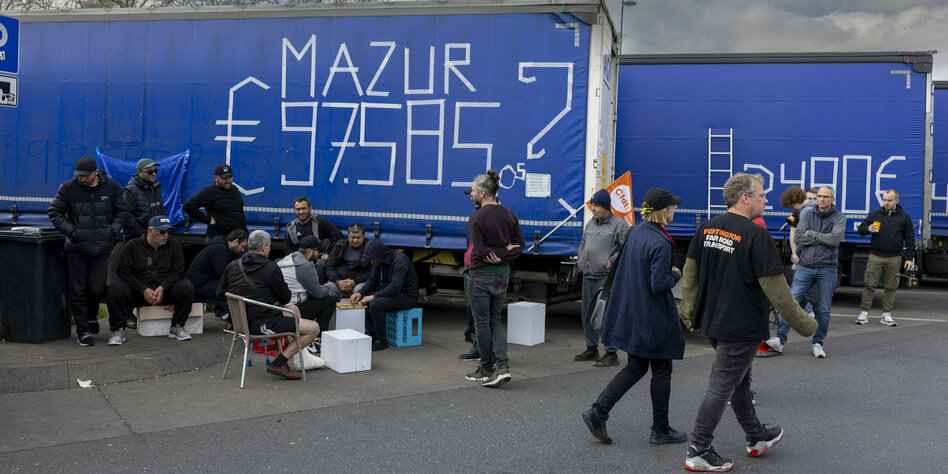There is another wildcat strike at the Gräfenhausen freeway service station. As we have already reported in three different articles, around 60 truck drivers went on strike in mid-March at the Gräfenhausen freeway service station in southern Hessen to demand payment of their unpaid wages. The truck drivers, most of whom come from Georgia and Uzbekistan and were employed by the Polish Mazur Group, which operates several transport companies, were systematically deprived of their wages. In some cases, this involved wage theft amounting to 4000 euros. The Mazur group of Companies is known to drive among other things also orders for large monopoly corporations such as Siemens or Ikea.
At that time the fight of the truck drivers attained country wide attention above all over the fact that in the connection to the strike beginning the Polish carrier hired a notorious Polish "detective company" to break the wild strike. In practice, the "detective company" turned out to be more like a mercenary company, which drove to the rest stop, complete with armored vehicles and all kinds of lumpen in bulletproof vests and paramilitary uniforms, in order to intimidate the strikers and bring the trucks back under the control of the group. These striking truck drivers, however, were not intimidated by the threats and violence of the Mazur Group's beating guards at the time and literally beat them away before the German police had to separate the two sides. After all attempts at intimidation on the part of the group of companies failed, the truckers then won an outright victory. The Mazur company made a written commitment to pay all outstanding wages in full. In addition, it was stated in the letter that no legal action would be taken against the drivers.
Now more than 120 truck drivers are on strike again at the freeway service station in Gräfenhausen. In addition, the wildcat strike has also been extended to the nearby Pfungstadt-West freeway service station. With the strike of the truck drivers it is again the fight against the enterprise and carrier group Mazur and again it is about missing wage payments, this time even in the range of more than 10,000 euro. Also this time the majority of the 120 truck drivers come from oppressed nations. Among them, as in the last wildcat strike, there are many people from Uzbekistan and Georgia, but this time there are also many truck drivers from Tajikistan, Kazakhstan, Kyrgyzstan, Ukraine and even the Philippines. This shows once more how the profits of big monopolists like Siemens, Ikea, Volkswagen or LKW Walter are made on the backs of workers from the oppressed nations even in the imperialist countries. Part of this system which transport companies like Mazur run, is to employ truck drivers from non-EU countries as fake self-employed with so-called garbage contracts and thus to have a possibility to exploit them particularly harshly. This time, however, the striking truck drivers are not only concerned about unpaid wages, but also about the miserable working and living conditions under which they have to exist. Thus the truck drivers are forced not to keep their legally prescribed break times and must live in their trucks.
Like the last time, the DGB allegedly wants to support the striking truck drivers. This alleged support, which is represented by the DGB initiative "Fair Mobility", is now looking for a strike site for the strikers in contact with neighboring municipalities. Under the pretext of the unsatisfactory hygenic supply possibilities and accommodations the strikers are to move into a hall or large parking lots. However also in the interviews of DGB with the FFH-radio it becomes clear what the DGB really wants, which is to take out the pressure created by the drivers also on German soil.According to the DGB boss of Hessen and professional German Michael Rudof Rest areas are there, so that truck drivers could rest there and not so that they strike there and that do not go so " of course ".
At this point, it should be emphasized that this strike, like the last one, is not a strike organized by the DGB or one of its member unions, but a so-called wildcat strike. A wildcat strike is, by definition, a strike led by workers independently of the unions. In the FRG (and some other countries such as the US), wildcat strikes are illegal, since the law requires that a strike be led by a trade union and, in addition, strikes may only be held during negotiations. In German jurisdiction it even goes so far that strikes, depending on the interpretation, may only be used as a so-called "last resort" and "proportionate". That is why the wildcat strike in Gräfenhausen is something special. Because at the moment all big unions in the FRG are so-called yellow unions. That means unions that do not rely on the organized class struggle of the workers for their demands, but on social partnership.In other words, on class collaboration and mediation between capitalists and workers. We could see the result this year in several strikes for inflation compensation, which were betrayed by the union leadership like the postal strike.
Meanwhile the striking truck drivers show which readiness to fight lies in the wildcat strike, as one can take a quotation from the FFH radio:" "When I heard, there is again a strike in Gräfenhausen, I said to myself, there I participate", tells Vladimer Pilauris. The stocky man with the silver-gray stubble and a dark jacket has reached the end of his patience. "I've been waiting for my money for five months," he says. The employer in Poland now owes him 8,600 euros, he says. He just wants the outstanding money and then to have nothing more to do with the company."











